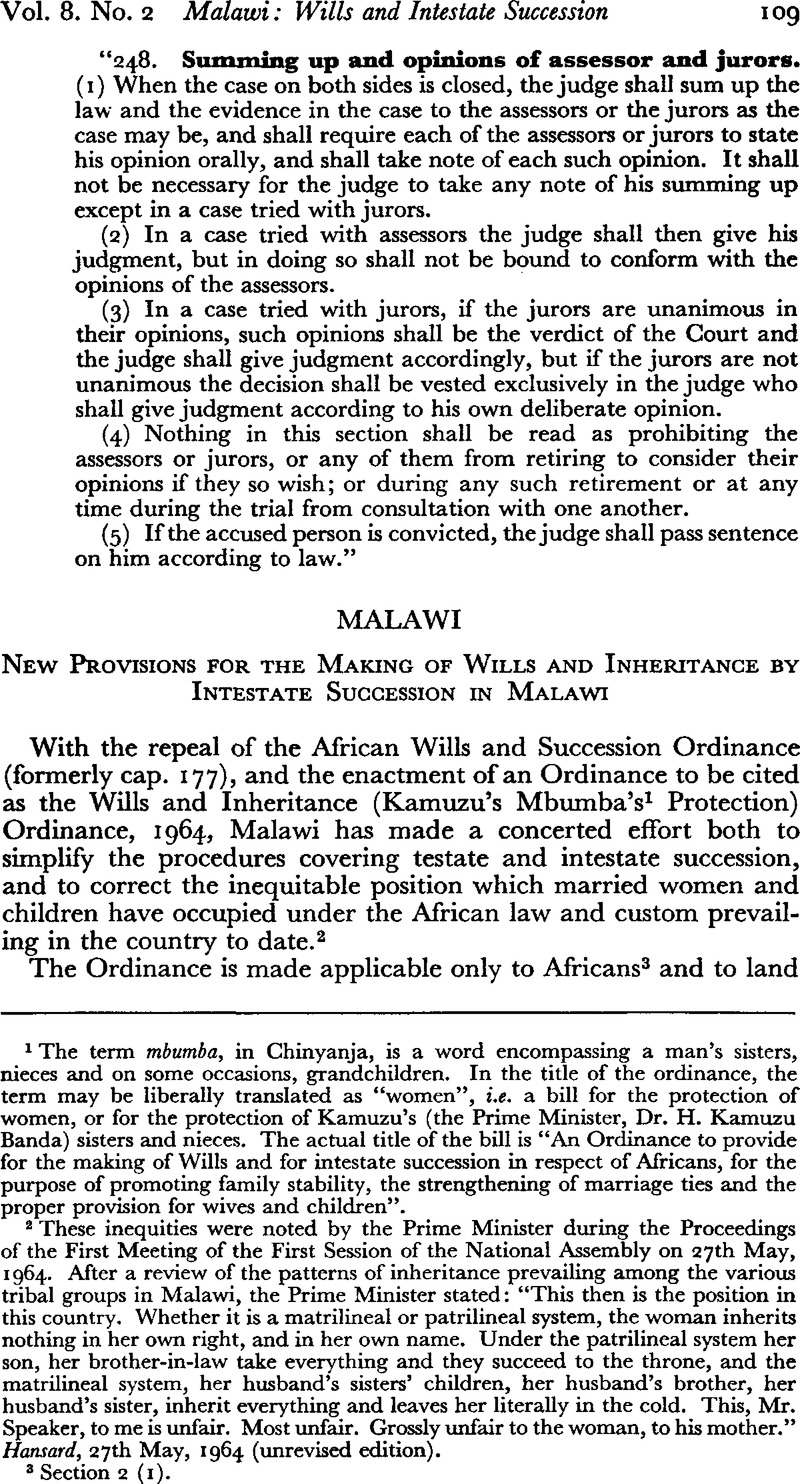No CrossRef data available.
Article contents
Abstract

- Type
- Legislation
- Information
- Copyright
- Copyright © School of Oriental and African Studies 1964
References
1 The term mbumba, in Chinyanja, is a word encompassing a man's sisters, nieces and on some occasions, grandchildren. In the title of the ordinance, the term may be liberally translated as “women”, i.e. a bill for the protection of women, or for the protection of Kamuzu's (the Prime Minister, Dr. H. Kamuzu Banda) sisters and nieces. The actual title of the bill is “An Ordinance to provide for the making of Wills and for intestate succession in respect of Africans, for the purpose of promoting family stability, the strengthening of marriage ties and the proper provision for wives and children”.
2 These inequities were noted by the Prime Minister during the Proceedings of the First Meeting of the First Session of the National Assembly on 27th May, 1964. After a review of the patterns of inheritance prevailing among the various tribal groups in Malawi, the Prime Minister stated: “This then is the position in this country. Whether it is a matrilineal or patrilineal system, the woman inherits nothing in her own right, and in her own name. Under the patrilineal system her son, her brother-in-law take everything and they succeed to the throne, and the matrilineal system, her husband's sisters’ children, her husband's brother, her husband's sister, inherit everything and leaves her literally in the cold. This, Mr. Speaker, to me is unfair. Most unfair. Grossly unfair to the woman, to his mother.” Hansard, 27th May, 1964 (unrevised edition).
3 Section 2 (1).
4 Section 2 (2).
5 Section 3 (1). Note the differences here from the definition of “African” found in other ordinances in force. For example, the Local Courts Ordinance, cap. 75 (enacted in 1962), defines “African” as “(a) any member of an indigenous race of Africa; and (b) any person who resided in the Protectorate as a member of such race”. In the African Emigration and Immigrant Workers Ordinance, cap. 79: “‘African’ means any member of the aboriginal tribes or races of Africa who is normally resident in the Protectorate and includes any such person having the blood of any such tribe or race and habitually residing among and after the manner of any such tribe or race.” Other ordinances contain no definition of the term; notably the African Employment Ordinance, cap. 85, the African Marriage (Christian Rites) Registration Ordinance, cap. 104, and the African Wills and Succession Ordinance (formerly cap. 177). Thus it would appear possible that an “African” under the provisions of one ordinance might not fall under the purview of another “African” ordinance. Whether the definitions were originally drawn in terms of inclusion or exclusion of certain groups is unknown.
6 Section 3(1).
7 Section 4. There should be little conflict between the provisions of this section and Islamic law in Malawi. As Professor J. N. D. Anderson has pointed out, the Yao are virtually the only Muslims in the country outside the Indian community, but, as he states: “In the main, however, the Yao are extremely ignorant of their professed religion …”. He further states: “Inheritance almost invariably follows tribal custom …”, i.e. matrilineal and, except in the case of chiefs, matrilocal. Problems of acceptance and implementation of the Ordinance should, therefore, be relatively the same as may be encountered among other tribal groups. See Anderson, J. N. D., Islamic Law in Africa, pp. 166–168.Google Scholar
8 Section 5 (1).
9 Section 5 (5).See also, Local Courts Ordinance, cap. 75.
10 Section 5 (2). In view of existing literacy problems in the country, it is surprising that the provisions of s. 8 of the African Wills and Succession Ordinance, formerly cap. 177, were not incorporated in the present Ordinance. This section provided for the testator to “sign” the will by use of his thumbprint, whereas s. 5 (2) of the present Ordinance utilizes only the word “sign”.
11 An nkhoswe, in Chinyanja, is a marriage witness; in the southern and central regions, there are normally two nkhoswe representing each party to the marriage.
12 Section 5 (4).
13 Section 5 (3).
14 Section 6 (1).
15 Section 6 (2).
16 Section 7.
17 Sections 8 and 9.
18 Section 9 (2).
19 The section makes provision for distribution of 4/5ths of the property to be divided between the wife or wives of the deceased and his surviving children, with the remaining 1/5th part devolving upon the other surviving relatives and dependants in accordance with the personal customary law of the deceased.
20 Section 12 (1).
page 112 note 1 Section 12 (2).
page 112 note 2 Section 12 (3).
page 112 note 3 Section 12 (5).
page 112 note 4 Section 12 (4).
page 112 note 5 Section 12 (6).
page 112 note 6 This differs from the African Wills and Succession Ordinance, repealed. See part VI thereof, ss. 32 et seq.
page 112 note 7 Section 12 (7).
page 112 note 8 Section 15.
page 112 note 9 Section 16.
page 112 note 10 Section 17.


